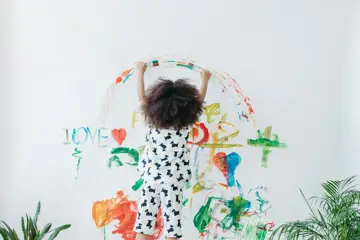A child’s identity is based on a range of factors including their ethnicity, religion, language, sexuality, gender orientation, family relationships and the community they live in. If they live in a culturally diverse area they will be aware of more people like themselves. However, if they are placed in a predominantly white area, they may feel isolated or excluded by their peers for being perceived to be “different”.
Practical things, such as food and diet, hair care, social activities, and education, are also very important in forming a child’s identity. Below there is advice on how foster carers can meet these practical needs.

Food and Diet
-
Try to provide a child with foods that are familiar, or which maintain or begin to build links with their cultural background. Share these meals as a household, including everyone in the meal.
-
Ensure any religious or cultural food guidance or prohibitions are adhered to, in line with the child’s wishes and guidance from their social worker.
-
Do not make assumptions about a child’s needs or preferences.
Skincare
-
Everyone’s skin differs in colour, texture, and type. Appropriate care of a child or young person’s skin is an important part of caring for their well-being and should not be neglected.
-
Some children may have dry skin types, so regular moisturising is important.
-
Some children are more likely to suffer from sensitive skin, and so care is needed when choosing products - e.g., avoid those which contain alcohol.
-
Be aware of children or young people using or obtaining skin whitening products. These should always be avoided as they can cause permanent skin damage.
-
All types of skin need protecting from sun damage by applying sun cream. Always use a high factor sun cream for babies and young children.
Haircare
-
In all cultures, hair grooming is an important part of someone’s every-day personal care and appearance, so it should not be overlooked.
-
Too often, the hair care of Black children and young people in care is neglected as many social workers and foster carers have little, or no knowledge about hair care. Instead, reach out to others, and don’t be afraid to ask for help or advice!
-
An awareness of different religious traditions and beliefs is also important.
-
You should always check with the placing social worker and the child’s family about how to care for their hair, and whether or not they can have it cut.
Books and toys
-
For children to happily live in a multicultural society, and play a positive role in it, we need books which reflect and respect the diversity of culture, ethnic, and religious backgrounds.
-
It is often said that if you can see it, you can be it! Children need to have books and toys that reflect themselves, their families, and their communities.
Music
-
Music plays a central role in all cultural expression. Therefore, it would be helpful to introduce children to different forms of music and instruments.
-
Look around for songs and stories from other cultures, not just those that may originate from White sources.
-
Older children will already have their favourite bands or artists, and it’s important to respect that this is a key part of their cultural identity and to engage in this music with them wherever possible.
Social media and the internet
-
Social media is used by many young people to keep in touch with their friends, to follow groups and trends, and to socialise. As with all internet based activity, it is important to be aware of which sites your foster child is engaging with and to ensure their safety.
Further resources
Black History Month 365
https://wandsworth.gov.uk/black-history-month
Focuses on celebrating the accomplishments and culture of Black people all year round with several events held throughout the year
The Voice Online
https://www.voice-online.co.uk/
The only British national black newspaper operating in the United Kingdom
Black Beauty and Hair
https://www.blackbeautyandhair.com/
The UKs #1 black hair and beauty magazine


